2022届高考英语二轮复习:代词用法课件(49张)
文档属性
| 名称 | 2022届高考英语二轮复习:代词用法课件(49张) | 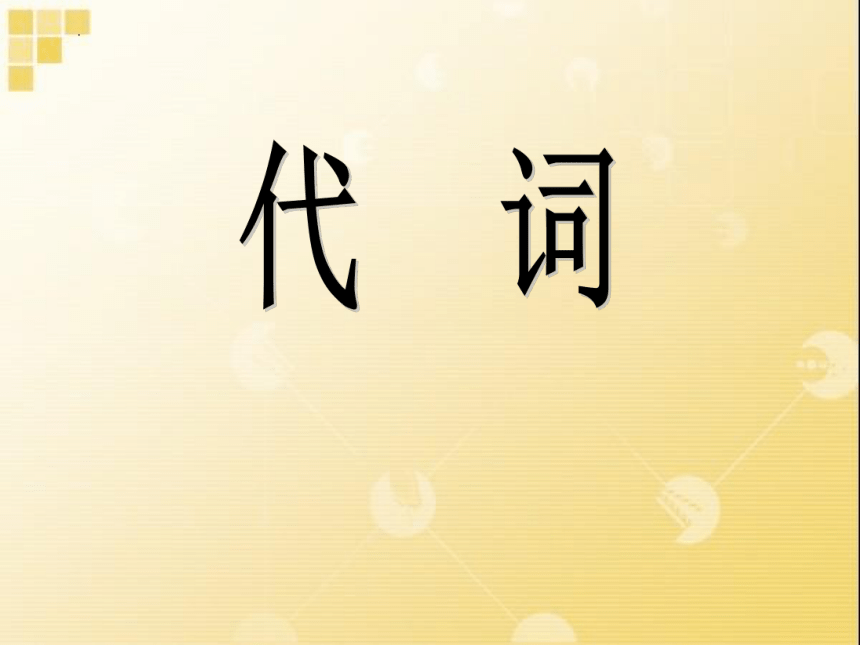 | |
| 格式 | pptx | ||
| 文件大小 | 182.2KB | ||
| 资源类型 | 教案 | ||
| 版本资源 | 通用版 | ||
| 科目 | 英语 | ||
| 更新时间 | 2022-05-02 22:49:05 | ||
图片预览


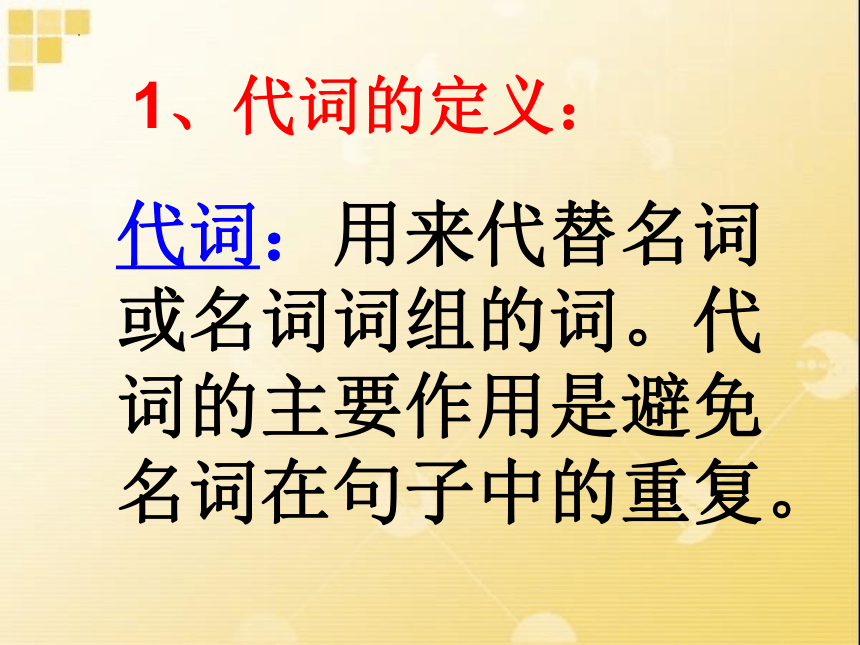

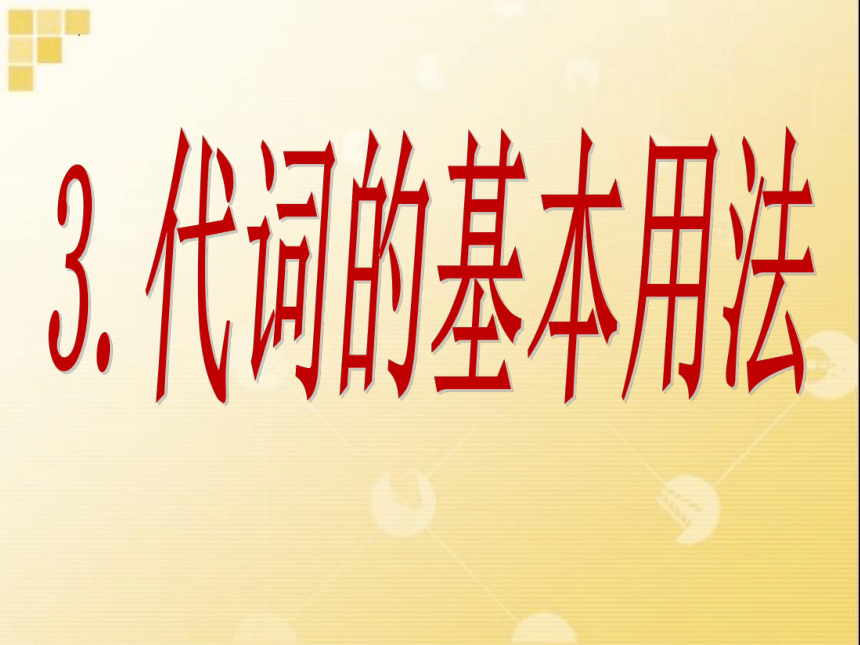
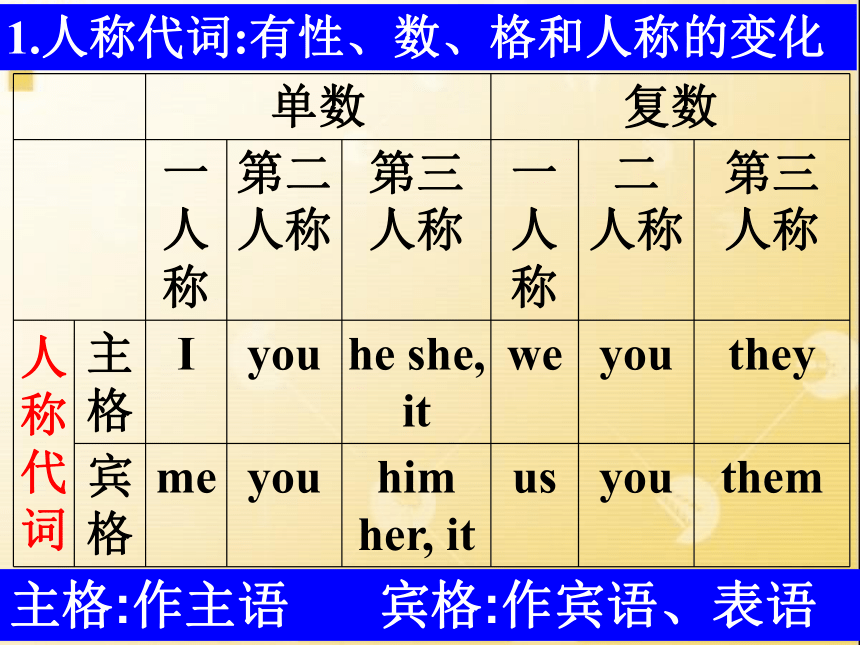
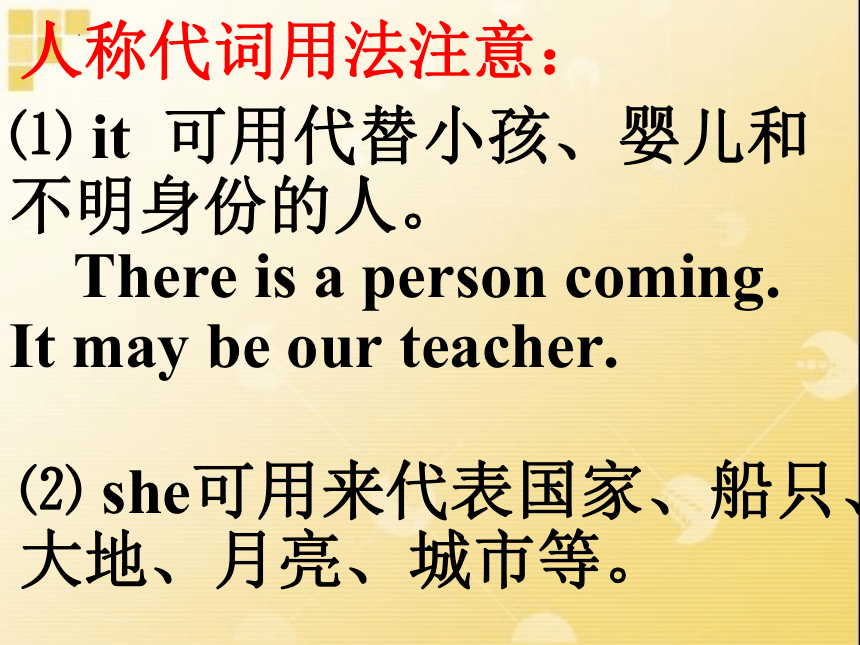

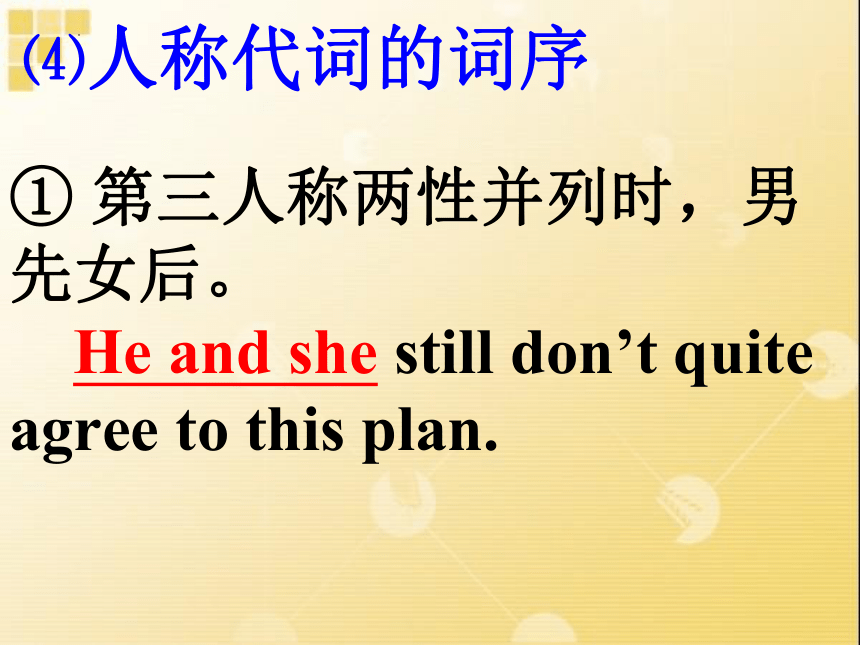
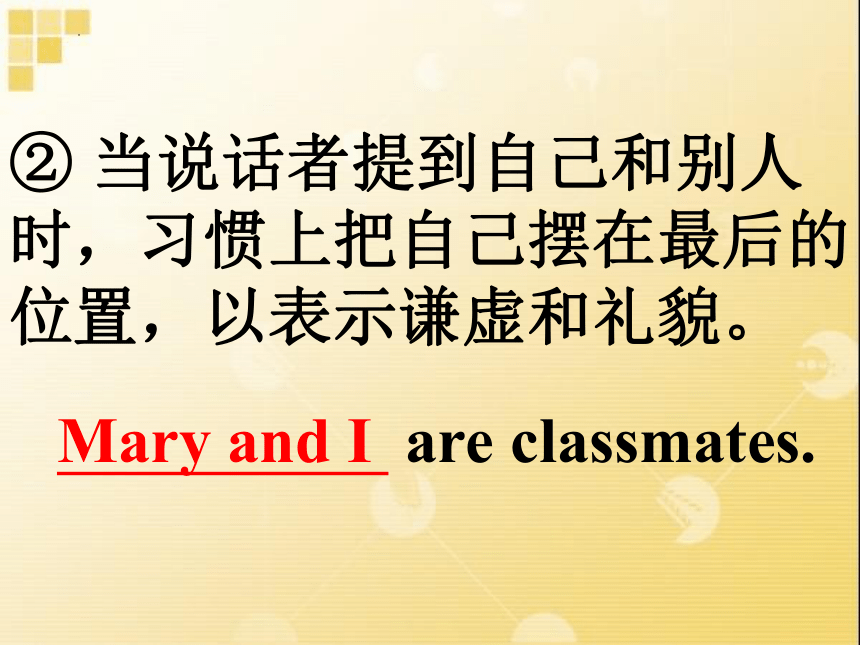
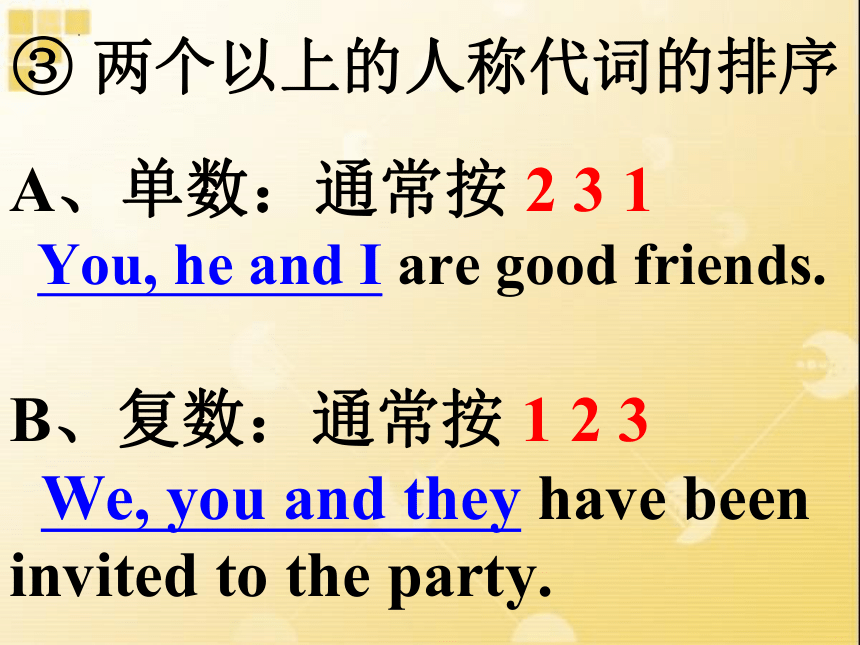

文档简介
(共49张PPT)
代 词
1、代词的定义
2、代词的分类
3、代词的基本用法
4、it 的用法
代词:用来代替名词或名词词组的词。代词的主要作用是避免名词在句子中的重复。
1、代词的定义:
2、代词的分类
1、人称代词
2、物主代词
3、反身代词
4、指示代词
5、不定代词
6、相互代词
7、疑问代词
8、关系代词
9、连接代词
3.代词的基本用法
单数 复数 一 人称 第二 人称 第三 人称 一 人称 二 人称 第三
人称
人称代词 主格 I you he she, it we you they
宾格 me you him her, it us you them
主格:作主语 宾格:作宾语、表语
1.人称代词:有性、数、格和人称的变化
人称代词用法注意:
⑴ it 可用代替小孩、婴儿和不明身份的人。
There is a person coming. It may be our teacher.
⑵ she可用来代表国家、船只、 大地、月亮、城市等。
⑶人称代词在对话中作简略答语或单独使用,或在表示惊奇、反问、否定、不满等感彩的句子中,一般不用主格,而用宾格。
-- I’m hungry.
-- Me, too.
-- You ought to do it.
-- What, me
⑷人称代词的词序
① 第三人称两性并列时,男先女后。
He and she still don’t quite agree to this plan.
② 当说话者提到自己和别人时,习惯上把自己摆在最后的位置,以表示谦虚和礼貌。
Mary and I are classmates.
③ 两个以上的人称代词的排序
A、单数:通常按 2 3 1
You, he and I are good friends.
B、复数:通常按 1 2 3
We, you and they have been invited to the party.
C、承认过失,表示不吉祥的事或有不好的意思时,单数按1 3 2人称排列,复数按 3 2 1
I, he and you will be punished for being late.
They, you and we should leave here at once.
单数 复数 一 人称 第二 人称 第三 人称 一 人称 第二 人称 第三
人称
物主代词 形容 词性 my your his her its our your their
名词性 mine yours his hers its ours yours theirs
2、
物主代词用法注意:
⑴ 形容词性物主代词只能在句中作定语,名词性物主代词可以在句中作主语、宾语或表语。
The pen isn’t mine. Mine is red.
=The pen isn’t my pen.
My pen is red.
物主代词用法注意:
⑵ 如果名词前有其它定语,物主代词要放在其它定语的前面。
His younger brother is a doctor.
物主代词用法注意:
⑶和all, both连用时,物主代词要放在它们的后面。
Both his elder brothers are here.
I ate all my food.
3、 反身代词
myself, yourself,
himself, herself, itself
ourselves, yourselves, themselves
oneself
by oneself
for oneself
of oneself
(all) to oneself
单独, 独自地
为自己,亲自地
自动地,自发地
独享的,独自拥有的
I am not quite myself.
我不太舒服。
enjoy oneself
dress oneself
come to oneself
help oneself to
devote oneself to
make oneself at home
玩得开心
穿着,打扮
苏醒
自行取用
专心于, 献身
舒适自在,不拘束
4、 指示代词
this, that,
these, those
such,
the same
指示代词用法说明:
⑴ this 和 these一般指时间或空间上较近的人或物。
that 和 those 一般指时间或空间上较远的人或物。
I don’t want this book.
I want that one.
⑵ this 和 these一般指下面要讲的人或物。
that和those 一般指前面讲的人或物。
He was ill. That was why he didn’t come.
What I want you to remember is this : English is of great use.
⑶ 充当替代词的作用
The population of Shanghai is larger than that of Suzhou.
The bikes made in Shanghai are better than those made in Beijing.
that代替不可数名词或表特指的单数可数名词。
those 代替特指的复数可数名词.
⑷ 在电话用语中,this 表示我方,that表示他方。
-- Who is that
-- This is Mary speaking.
5、 不定代词
one, each, any, many, much,
both, all, either, neither, none, another, other, some
(a) few, (a) little
anyone, anybody, anything
someone, somebody, something
everyone, everybody, everything
nobody, nothing
不定代词基本用法
(1) some, any 用法
some:常用于肯定句
any:常用于否定句、疑问句、条件状语从句
① some也可用于疑问句,表请求、建议或希望对方作肯定回答。
Would you like some tea
② any 也可用于肯定句,表示“任何”之意。
Make it any day you like.
③ some 用于单数可数名词前,表示未知或未确定的人或物,“某一,某个”,相当于a certain
There must be some mistake.
He is in some kind of trouble.
④ some (adv.) 用于数词前,表示“大约,差不多”,相当于approximately
Some 20 days ago, he got it.
⑤ some 和 any (adv.)
均可修饰比较级,表示
“稍……些”。
Is she any better today
I’m feeling some better today.
(2) each, every基本用法:
① each 两个或两个以上的人或物中的每一个,侧重个别、个体。
every 三个或三个以上的人或物,侧重全体、全部。
② each 具有代词和形容词的特性,在句中可以作主语、宾语、同位语或定语。
every 只具有形容词的特性,在句中作定语。
Each of them has a dictionary.
He gave two apples to each.
They each have even been there.
Each worker has a separate room.
I know every student of the class.
each可接单数可数名词,可与of连用
every可接单数可数名词,不可与of连用
③ every 表示“每隔”
every+基数词+复数名词
every+few+复数名词
every+other/序数词+单数名词
every ten miles
every few+miles
every other/third mile
other, the other, others, the others, another 的用法
① 三者或三者以上中的另一个用another
② 一定范围内、两个人或物中特指剩下的“另一个”用the other
③ 表示在一个范围内的其他全部,the others= the other +复数可数名词
(4) none, no one, nothing
none “没有人,没有任何东西”
用于否定三个或三个以上的人或物, 可以与of连用。可用于回答how many, how much 开头的问句。
-- How many books have you bought
-- None.
no one “没有人”,相当于nobody,不能与 of 短语连用,只能用作单数。可用于回答who 开头的问句。
-- Who can answer the question
-- No one.
-- Is there anyone in the room
-- No one.
nothing “没有东西,没有什么”。用于回答what 开头的问句。
-- What did you do yesterday
-- Nothing.
(5) many, much, (a) few,
(a) little 的用法
many 指代可数名词
much指代不可数名词。
few, a few指代可数名词
little, a little指代不可数名词
a few, a little 表肯定意义
few, little表否定意义
(7)
anything but 并不,绝对不nothing but 只不过,仅仅
something of 达到某种程度
* The hotel was anything but satisfactory.
* I want nothing but the best for my children.
* I’m something of an expert on antiques.
这个旅店太让人不满意了。
我仅仅想把最好的给孩子。
我算得上是个古董专家
some, any, every 所构成的合成不定代词不能与 of 连用,但分开时可接 of 短语。
everyone of them
every one of them
注意:none of them
no one 后不接 of 短语
(8) 合成不定代词基本用法
6、 相互代词
each other
one another
用于三者或三者以上
用于两者之间
7、 疑问代词(特殊疑问句)
who, whom,
which, what
whose
8、关系代词(引导定语从句)
who, whom,
which, that
whose, as
9、 连接代词
(引导名词性从句,并在从句中担任成份。)
who, whom,
which, what
whose
代 词
1、代词的定义
2、代词的分类
3、代词的基本用法
4、it 的用法
代词:用来代替名词或名词词组的词。代词的主要作用是避免名词在句子中的重复。
1、代词的定义:
2、代词的分类
1、人称代词
2、物主代词
3、反身代词
4、指示代词
5、不定代词
6、相互代词
7、疑问代词
8、关系代词
9、连接代词
3.代词的基本用法
单数 复数 一 人称 第二 人称 第三 人称 一 人称 二 人称 第三
人称
人称代词 主格 I you he she, it we you they
宾格 me you him her, it us you them
主格:作主语 宾格:作宾语、表语
1.人称代词:有性、数、格和人称的变化
人称代词用法注意:
⑴ it 可用代替小孩、婴儿和不明身份的人。
There is a person coming. It may be our teacher.
⑵ she可用来代表国家、船只、 大地、月亮、城市等。
⑶人称代词在对话中作简略答语或单独使用,或在表示惊奇、反问、否定、不满等感彩的句子中,一般不用主格,而用宾格。
-- I’m hungry.
-- Me, too.
-- You ought to do it.
-- What, me
⑷人称代词的词序
① 第三人称两性并列时,男先女后。
He and she still don’t quite agree to this plan.
② 当说话者提到自己和别人时,习惯上把自己摆在最后的位置,以表示谦虚和礼貌。
Mary and I are classmates.
③ 两个以上的人称代词的排序
A、单数:通常按 2 3 1
You, he and I are good friends.
B、复数:通常按 1 2 3
We, you and they have been invited to the party.
C、承认过失,表示不吉祥的事或有不好的意思时,单数按1 3 2人称排列,复数按 3 2 1
I, he and you will be punished for being late.
They, you and we should leave here at once.
单数 复数 一 人称 第二 人称 第三 人称 一 人称 第二 人称 第三
人称
物主代词 形容 词性 my your his her its our your their
名词性 mine yours his hers its ours yours theirs
2、
物主代词用法注意:
⑴ 形容词性物主代词只能在句中作定语,名词性物主代词可以在句中作主语、宾语或表语。
The pen isn’t mine. Mine is red.
=The pen isn’t my pen.
My pen is red.
物主代词用法注意:
⑵ 如果名词前有其它定语,物主代词要放在其它定语的前面。
His younger brother is a doctor.
物主代词用法注意:
⑶和all, both连用时,物主代词要放在它们的后面。
Both his elder brothers are here.
I ate all my food.
3、 反身代词
myself, yourself,
himself, herself, itself
ourselves, yourselves, themselves
oneself
by oneself
for oneself
of oneself
(all) to oneself
单独, 独自地
为自己,亲自地
自动地,自发地
独享的,独自拥有的
I am not quite myself.
我不太舒服。
enjoy oneself
dress oneself
come to oneself
help oneself to
devote oneself to
make oneself at home
玩得开心
穿着,打扮
苏醒
自行取用
专心于, 献身
舒适自在,不拘束
4、 指示代词
this, that,
these, those
such,
the same
指示代词用法说明:
⑴ this 和 these一般指时间或空间上较近的人或物。
that 和 those 一般指时间或空间上较远的人或物。
I don’t want this book.
I want that one.
⑵ this 和 these一般指下面要讲的人或物。
that和those 一般指前面讲的人或物。
He was ill. That was why he didn’t come.
What I want you to remember is this : English is of great use.
⑶ 充当替代词的作用
The population of Shanghai is larger than that of Suzhou.
The bikes made in Shanghai are better than those made in Beijing.
that代替不可数名词或表特指的单数可数名词。
those 代替特指的复数可数名词.
⑷ 在电话用语中,this 表示我方,that表示他方。
-- Who is that
-- This is Mary speaking.
5、 不定代词
one, each, any, many, much,
both, all, either, neither, none, another, other, some
(a) few, (a) little
anyone, anybody, anything
someone, somebody, something
everyone, everybody, everything
nobody, nothing
不定代词基本用法
(1) some, any 用法
some:常用于肯定句
any:常用于否定句、疑问句、条件状语从句
① some也可用于疑问句,表请求、建议或希望对方作肯定回答。
Would you like some tea
② any 也可用于肯定句,表示“任何”之意。
Make it any day you like.
③ some 用于单数可数名词前,表示未知或未确定的人或物,“某一,某个”,相当于a certain
There must be some mistake.
He is in some kind of trouble.
④ some (adv.) 用于数词前,表示“大约,差不多”,相当于approximately
Some 20 days ago, he got it.
⑤ some 和 any (adv.)
均可修饰比较级,表示
“稍……些”。
Is she any better today
I’m feeling some better today.
(2) each, every基本用法:
① each 两个或两个以上的人或物中的每一个,侧重个别、个体。
every 三个或三个以上的人或物,侧重全体、全部。
② each 具有代词和形容词的特性,在句中可以作主语、宾语、同位语或定语。
every 只具有形容词的特性,在句中作定语。
Each of them has a dictionary.
He gave two apples to each.
They each have even been there.
Each worker has a separate room.
I know every student of the class.
each可接单数可数名词,可与of连用
every可接单数可数名词,不可与of连用
③ every 表示“每隔”
every+基数词+复数名词
every+few+复数名词
every+other/序数词+单数名词
every ten miles
every few+miles
every other/third mile
other, the other, others, the others, another 的用法
① 三者或三者以上中的另一个用another
② 一定范围内、两个人或物中特指剩下的“另一个”用the other
③ 表示在一个范围内的其他全部,the others= the other +复数可数名词
(4) none, no one, nothing
none “没有人,没有任何东西”
用于否定三个或三个以上的人或物, 可以与of连用。可用于回答how many, how much 开头的问句。
-- How many books have you bought
-- None.
no one “没有人”,相当于nobody,不能与 of 短语连用,只能用作单数。可用于回答who 开头的问句。
-- Who can answer the question
-- No one.
-- Is there anyone in the room
-- No one.
nothing “没有东西,没有什么”。用于回答what 开头的问句。
-- What did you do yesterday
-- Nothing.
(5) many, much, (a) few,
(a) little 的用法
many 指代可数名词
much指代不可数名词。
few, a few指代可数名词
little, a little指代不可数名词
a few, a little 表肯定意义
few, little表否定意义
(7)
anything but 并不,绝对不nothing but 只不过,仅仅
something of 达到某种程度
* The hotel was anything but satisfactory.
* I want nothing but the best for my children.
* I’m something of an expert on antiques.
这个旅店太让人不满意了。
我仅仅想把最好的给孩子。
我算得上是个古董专家
some, any, every 所构成的合成不定代词不能与 of 连用,但分开时可接 of 短语。
everyone of them
every one of them
注意:none of them
no one 后不接 of 短语
(8) 合成不定代词基本用法
6、 相互代词
each other
one another
用于三者或三者以上
用于两者之间
7、 疑问代词(特殊疑问句)
who, whom,
which, what
whose
8、关系代词(引导定语从句)
who, whom,
which, that
whose, as
9、 连接代词
(引导名词性从句,并在从句中担任成份。)
who, whom,
which, what
whose
